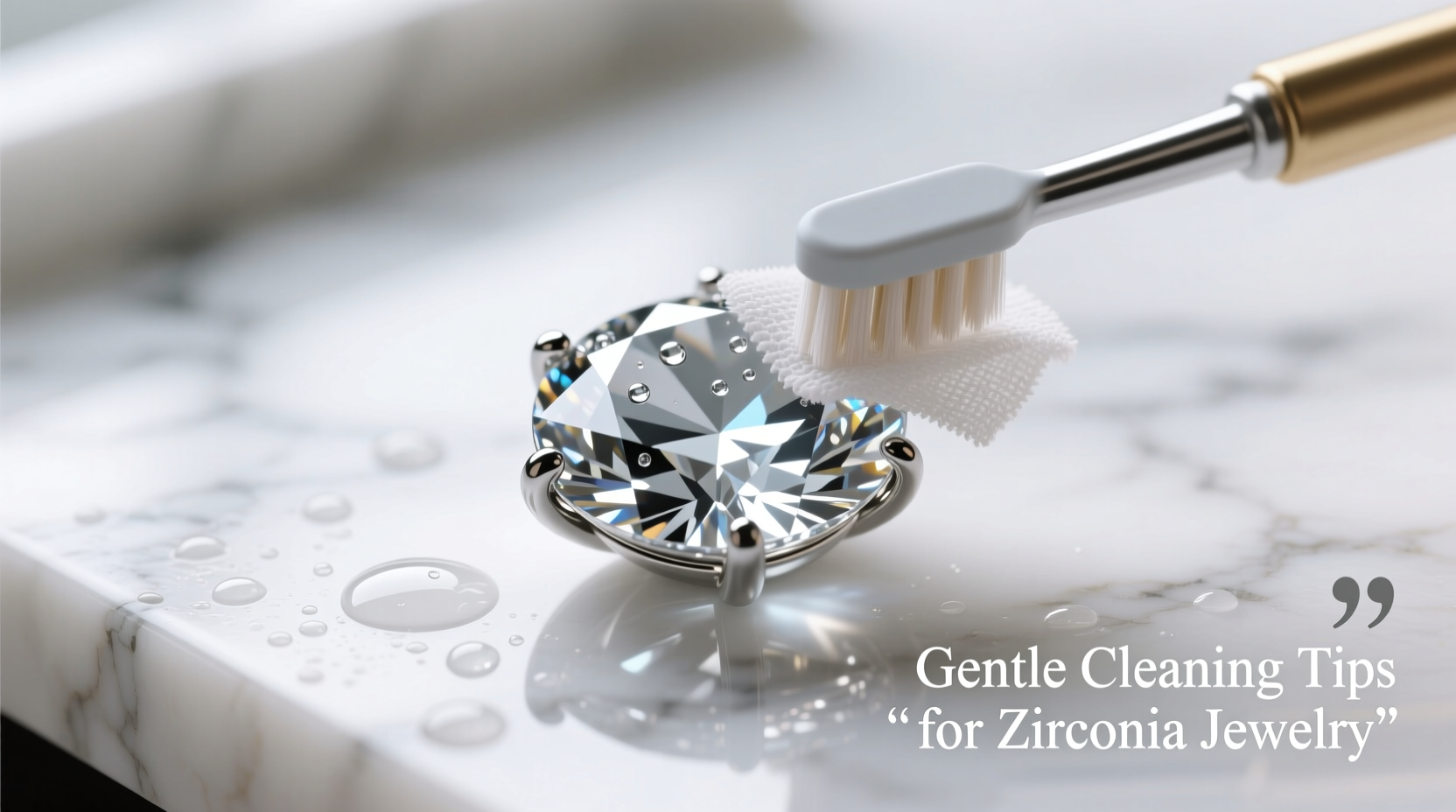Zirconia jewelry—often crafted from cubic zirconia (CZ)—offers the sparkle of diamonds at a fraction of the cost. Its brilliance, clarity, and affordability make it a favorite for everyday wear and special occasions alike. However, like any gemstone, zirconia can lose its luster when exposed to oils, lotions, dirt, and environmental pollutants. The key to maintaining its radiant shine lies in proper cleaning—but not all methods are safe. Aggressive chemicals or rough handling can scratch the surface or degrade the metal setting. This guide outlines proven, gentle techniques to keep your zirconia jewelry looking pristine without risking damage.
Understanding Zirconia and Why It Needs Care

Cubic zirconia is a synthetic crystalline material designed to mimic the optical properties of diamonds. While durable, it ranks between 8 and 8.5 on the Mohs hardness scale—making it resistant to scratches under normal conditions but still vulnerable to harder substances like quartz or diamond dust. Unlike natural gemstones, CZ is often coated with thin-film enhancements to boost color or fire, which can be stripped by harsh cleaners.
Additionally, zirconia’s high refractive index means that even minor surface buildup can significantly dull its sparkle. Regular cleaning preserves both appearance and longevity. However, because many zirconia pieces are set in silver, gold-plated, or base metals, cleaning must also consider the integrity of the setting. Abrasives or acidic solutions can corrode metal, loosen prongs, or cause tarnishing.
“Many people assume zirconia doesn’t need care because it’s ‘fake,’ but neglect leads to cloudiness and premature wear. Gentle, consistent maintenance keeps it looking luxurious.” — Lena Torres, Gemologist & Jewelry Conservator
Gentle Cleaning Methods That Work
The best cleaning approaches for zirconia jewelry rely on mild ingredients and soft tools. Below are four safe, effective methods suitable for most settings.
1. Warm Water and Mild Dish Soap (Recommended Weekly Method)
This is the gold standard for routine cleaning. It removes daily grime without harming the stone or metal.
- Mix a few drops of phosphate-free dish soap into a bowl of lukewarm water.
- Soak the jewelry for 15–20 minutes to loosen debris.
- Use a soft-bristled toothbrush (preferably new and reserved for jewelry) to gently scrub around the stone and under the setting.
- Rinse thoroughly under warm running water.
- Dry completely with a lint-free microfiber cloth.
2. Baking Soda Paste (For Stubborn Buildup)
When soap and water aren’t enough, a baking soda paste offers mild abrasion without scratching.
- Mix one teaspoon of baking soda with just enough water to form a thick paste.
- Apply with a cotton swab or soft brush, focusing on crevices.
- Let sit for 2–3 minutes, then gently brush and rinse.
- Dry with a microfiber cloth.
Note: Avoid this method on antique or plated pieces, as repeated use may wear down thin metal layers over time.
3. Ammonia Solution (For Deep Cleaning – Use Sparingly)
A diluted ammonia solution effectively dissolves oils and restores shine, but should only be used occasionally and never on porous or plated metals.
| Ingredient | Amount | Instructions |
|---|---|---|
| Clear household ammonia | 1 part | Mix with 6 parts water in a glass container |
| Zirconia jewelry | 1–2 pieces | Soak for no more than 10 minutes |
| Soft brush | N/A | Lightly scrub after soaking, then rinse and dry |
Do not use on jewelry with glued components or opal-like coatings, as ammonia can weaken adhesives.
4. Commercial Jewelry Cleaners (Choose Wisely)
If opting for store-bought solutions, select those labeled “safe for all gemstones” and “non-abrasive.” Avoid cleaners containing chlorine, acetone, or alcohol, which can erode metal and strip protective coatings.
What to Avoid When Cleaning Zirconia
Even well-intentioned cleaning habits can do more harm than good. The following practices should be strictly avoided:
- Ultrasonic cleaners: While effective for diamonds, these machines can loosen poorly set stones or damage fragile coatings on CZ.
- Steam cleaners: High heat and pressure may crack stones or warp metal settings, especially in older jewelry.
- Toothpaste: Despite popular belief, toothpaste is abrasive and can leave microscopic scratches on both stone and metal.
- Paper towels or tissues: These materials can be rough and may snag on prongs; always use a soft, non-linting cloth.
- Harsh chemicals: Bleach, oven cleaner, and bathroom disinfectants can discolor or pit metal and damage stone finishes.
“Once a zirconia stone gets scratched, the damage is permanent. Prevention through gentle care is far better than repair.” — Dr. Alan Kim, Materials Scientist specializing in synthetic gems
Mini Case Study: Reviving a Cloudy Engagement Ring Alternative
Sophie, a teacher from Portland, wore her zirconia solitaire ring daily but noticed it had turned cloudy after six months. She had been cleaning it weekly with a jewelry wipe containing alcohol, unaware of the long-term effect. After consulting a local jeweler, she learned the anti-reflective coating on her stone was partially stripped.
She switched to a regimen of bi-weekly warm soapy water soaks and monthly air-drying instead of wiping. Within three weeks, the ring regained much of its original brilliance. Her jeweler advised against further chemical exposure and recommended storing it separately to avoid scratches. Sophie now cleans her ring every Sunday evening—a simple habit that preserved both beauty and sentimental value.
Checklist: Safe Zirconia Jewelry Care Routine
Follow this checklist to maintain your zirconia jewelry safely and consistently:
- ☑ Remove jewelry before swimming, cleaning, or applying cosmetics
- ☑ Clean with mild soap and water every 1–2 weeks
- ☑ Use only soft brushes and lint-free cloths
- ☑ Store each piece in a fabric-lined box or soft pouch
- ☑ Inspect prongs and settings monthly for looseness
- ☑ Avoid ultrasonic and steam cleaners
- ☑ Limit use of commercial cleaners to once every 2–3 months
Frequently Asked Questions
Can I wear zirconia jewelry in the shower?
It’s best to remove zirconia jewelry before showering. Soap scum, shampoo residue, and hard water minerals can build up quickly, dulling the stone’s surface. Frequent exposure also increases the risk of loosening settings over time.
Why does my zirconia jewelry look cloudy?
Cloudiness usually results from accumulated oils, lotions, or microscopic scratches. In some cases, it may indicate a degraded coating. Regular gentle cleaning helps prevent buildup, while avoiding abrasive materials reduces scratching.
How often should I professionally clean zirconia jewelry?
Professional cleaning isn’t typically necessary for zirconia, as home methods are sufficient. However, if you’re unsure about the condition of the setting or notice persistent haze, a jeweler can inspect and safely polish the metal without touching the stone.
Final Thoughts: Small Habits, Lasting Brilliance
Caring for zirconia jewelry doesn’t require expensive products or complex routines. The most effective strategy is consistency—regular, gentle cleaning combined with mindful wearing and storage. By avoiding common pitfalls and choosing methods that respect both the stone and its setting, you preserve not just appearance but the emotional and aesthetic value of your pieces.









 浙公网安备
33010002000092号
浙公网安备
33010002000092号 浙B2-20120091-4
浙B2-20120091-4
Comments
No comments yet. Why don't you start the discussion?